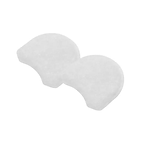CPAP Maintenance


Image Credits To: Philips Healthcare
Maintaining your CPAP equipment is essential for its longevity and your health. Regular cleaning and replacement routines are crucial to prevent upper respiratory infections, particularly if you're susceptible to nasal, sinus, or lung issues. It's generally recommended to clean your equipment regularly, and more frequently if you have a history of infections. Proper upkeep ensures your CPAP machine functions effectively, as the moist environment of hoses and masks can harbor bacteria and mold if not kept clean.


To clean your CPAP equipment such as mask, hose and water humidifier, use CPAP-specific soaps monthly or mild detergent. Ensure thorough rinsing and air-drying to prevent bacterial growth. Avoid harsh chemicals like bleach or alcohol as they can damage the equipment. After cleaning, allow your mask to air dry on a clean towel and hang the hose to dry thoroughly. Do not let the CPAP equipment dry or exposed under the sun. If necessary, run air through the hose to ensure it's completely dry before reconnecting. Using PAP mask wipes for nightly cleaning helps remove oil residues and improves the mask seal. The CPAP surface, mask surface and the humidifier tank can be disinfect by using any alcohol free disinfectant solution or wipes. Make sure to use distilled water / reverse osmosis water in the humidifier to avoid mineral buildup. Avoid using tap water and mineral water in the humdifier

_edited.jpg)
Filters also require regular maintenance. Disposable filters should be replaced monthly or sooner if visibly dirty. Reusable filters can be hand-washed monthly and replaced every six months to a year. If you live in a dusty environment or have pets, consider cleaning or replacing filters more frequently.

AirSense 10 Disposable Filter

DreamStation Reusable Pollen Filter



Dreamstation Disposable Ultra-Fine Filter
AirMini Disposable Filter
DreamStation Go Disposable Filter
During illness, increase cleaning frequency to daily until symptoms resolve to minimize reinfection risks. Regularly wiping down the CPAP machine exterior with a CPAP wipes or alcohol free disinfectant wipes and checking and replacing filters as needed also contributes to machine longevity. Proper storage in a clean, dry place is crucial to prevent contamination. Avoid using perfumed soaps or cleaning solutions, and never clean components in a dishwasher due to potential damage from high water temperatures. By following these detailed cleaning and maintenance practices, you can ensure your CPAP equipment operates efficiently and hygienically, supporting effective treatment for sleep apnea while safeguarding your respiratory health. Regular servicing by professionals every 1 year can further optimize machine performance and lifespan, ensuring your CPAP therapy remains effective over time.
Video Credits To: Philips Healthcare
Video Credits To: ResMed
For inquiries about machine servicing and CPAP cleaning accessories
-1%20(1).png)